新概念英语第二册第六课讲解
新概念英语第二册第六课6课课件

Jim was knocked over by a bike this morning. ③ vt. knock sb. down把(某人)打成……状态 他昨天把汤姆打倒过去了。
2
What is he doing? He is standing on his head(倒立) and singing.
3
Have you ever seen a beggar singing while he is
standing on his head???
4
L
5. Stand on one’s head 头顶地倒立 stand on one's hands 用手着地
Stand (stood, stood) 1)v. 站立, 直立 2)v. 起立
stand up! 起立! 3)v. 容忍 尤其用于否定句和疑问句中,与can/ could 连用 他受不了炎热的天气
once a wmeoekn.th
(F )
4.He always asks for a meal and a glass of beer.
(T )
13
I have just moved to a house in Bridge Street.
1.move v./n 1)移动,改变位置 2)搬家,迁居 3)使人动心而(流泪,微笑等) 她的故事令人感动得流泪。
26
27
2.说出下列词组
①敲门
knock at
②向某人索要某物 ask sb. for sth.
新概念英语第二册复习笔记 第六课 课文讲解
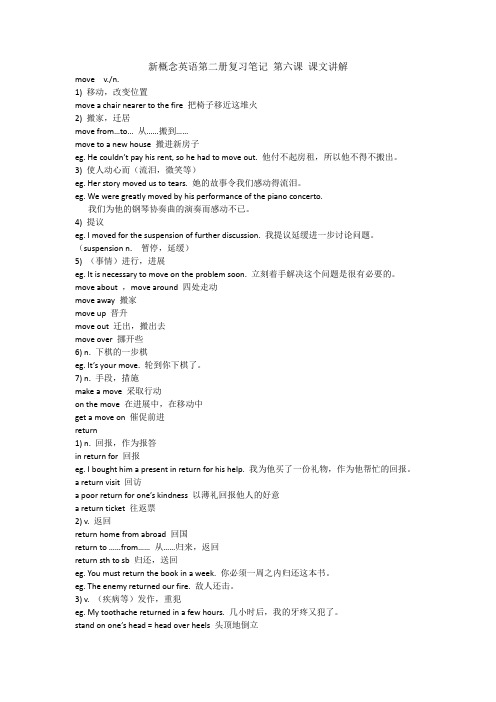
新概念英语第二册复习笔记第六课课文讲解move v./n.1) 移动,改变位置move a chair nearer to the fire 把椅子移近这堆火2) 搬家,迁居move from…to…从……搬到……move to a new house 搬进新房子eg. He couldn’t pay his rent, so he had to move out. 他付不起房租,所以他不得不搬出。
3) 使人动心而(流泪,微笑等)eg. Her story moved us to tears. 她的故事令我们感动得流泪。
eg. We were greatly moved by his performance of the piano concerto.我们为他的钢琴协奏曲的演奏而感动不已。
4) 提议eg. I moved for the suspension of further discussion. 我提议延缓进一步讨论问题。
(suspension n. 暂停,延缓)5) (事情)进行,进展eg. It is necessary to move on the problem soon. 立刻着手解决这个问题是很有必要的。
move about ,move around 四处走动move away 搬家move up 晋升move out 迁出,搬出去move over 挪开些6) n. 下棋的一步棋eg. It’s your move. 轮到你下棋了。
7) n. 手段,措施make a move 采取行动on the move 在进展中,在移动中get a move on 催促前进return1) n. 回报,作为报答in return for 回报eg. I bought him a present in return for his help. 我为他买了一份礼物,作为他帮忙的回报。
a return visit 回访a poor return for one’s kindness 以薄礼回报他人的好意a return ticket 往返票2) v. 返回return home from abroad 回国return to ……from……从……归来,返回return sth to sb 归还,送回eg. You must return the book in a week. 你必须一周之内归还这本书。
新概念二册第六课笔记小红书
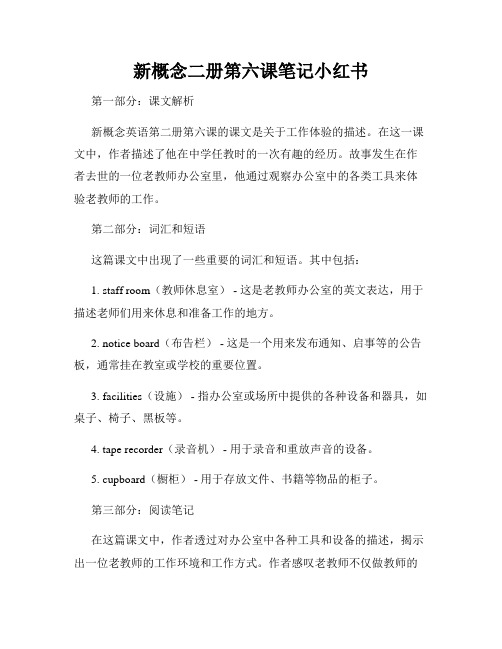
新概念二册第六课笔记小红书第一部分:课文解析新概念英语第二册第六课的课文是关于工作体验的描述。
在这一课文中,作者描述了他在中学任教时的一次有趣的经历。
故事发生在作者去世的一位老教师办公室里,他通过观察办公室中的各类工具来体验老教师的工作。
第二部分:词汇和短语这篇课文中出现了一些重要的词汇和短语。
其中包括:1. staff room(教师休息室) - 这是老教师办公室的英文表达,用于描述老师们用来休息和准备工作的地方。
2. notice board(布告栏) - 这是一个用来发布通知、启事等的公告板,通常挂在教室或学校的重要位置。
3. facilities(设施) - 指办公室或场所中提供的各种设备和器具,如桌子、椅子、黑板等。
4. tape recorder(录音机) - 用于录音和重放声音的设备。
5. cupboard(橱柜) - 用于存放文件、书籍等物品的柜子。
第三部分:阅读笔记在这篇课文中,作者透过对办公室中各种工具和设备的描述,揭示出一位老教师的工作环境和工作方式。
作者感叹老教师不仅做教师的工作,还积极参与学校的各种活动,并担任多项职务。
通过观察办公室的布局和设施,作者意识到教师的工作并不轻松,并需要处理各种事务。
此外,他还强调了老教师对教育事业所做的贡献以及他对学生的关怀和关注。
第四部分:个人观点我对这篇课文的理解是,教师职业是一项具有挑战性和责任感的工作。
通过课文中描述的老教师的工作环境和工作方式,我更加理解了教师们的辛勤付出和对学生的关心。
同时,我也认识到教育并不仅仅是课堂上的传授知识,还需要老师们参与到学校的各项活动中,为学生提供更全面的教育和支持。
第五部分:总结通过这一课文的学习,我对教师职业有了更深入的理解。
教师们所面临的挑战和工作压力不容忽视,他们需要同时处理好多个任务,并关心每一个学生的发展。
我对教师们的辛勤付出表示由衷的敬意,并希望将来能为教育事业做出自己的贡献。
以上是对新概念二册第六课的课文《笔记小红书》的解析和个人观点。
新概念英语第二册lesson6 ppt课件
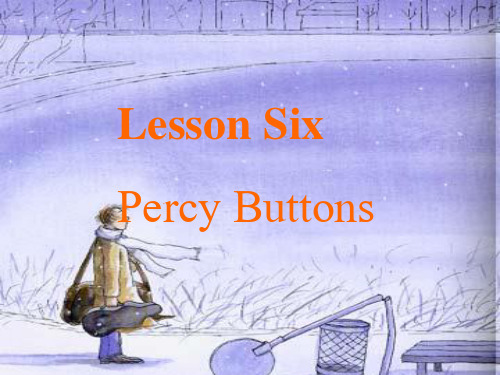
新概念英语第二册lesson6
• (2)向某人要,要求某物 • 我的弟弟每年都向我要押岁钱。 • My little brother begs me for lucky money every
year. • 那个小女孩向妈妈要了一条漂亮的裙子 • The girl begged her mother for that beautiful skirt.
Lesson Six Percy Buttons
新概念英语第二册lesson6
今 日 格言
While there is life there is hope. 留得青山在,不怕没柴烧。
新概念英语第二册lesson6
精品资料
1.损坏,使索然无味 2. 公共的
3. 友好的 4. 越过 5. 整个的
6. 唯一的,单一的 7. 令人兴奋的
8. 接受,收到
9. 公司,商行
10. 不同的 11. 服务 12. 在国外
13. 私人的 14.忍受 15.注意
16.参观博物馆17. 教我几句意大利语
18. 借你一本书 19. 作出了一个重大决定
20. 在乐山的中心 21. 许多地方
22. 我哥哥待在澳大利亚有六个月了。
Bridge Street?
新概念英语第二册lesson6
Read and answer
• I have just moved to a house in Bridge Street. Yesterday a beggar knocked at my door. He asked me for a meal and a glass of beer. In return for this, the beggar stood on his head and sang songs. I gave him a meal. He ate the food and drank the beer. Then he put a piece of cheese in his pocket and went away. Later a neighbour told me about him. Everybody knows him. His name is Percy Buttons. He calls at every house in the street once a month and always asks for a meal and a glass of beer.
新概念英语第二册第六课讲解

lesson 6 Percy Buttons一、生词和短语(词汇学习)词汇学习★knockknock at 敲(门窗等) ;knock at the door 敲门knock off: 下班,He knocked off earlier.knock sth off+ 地点:把某物从某处碰翻;knock the vase off the tableknock off: 打折,knock 10% off the price. 把价格降低10%。
knock over:打翻,碰翻 A car knocked the boy over. He knocked a glass over. 他把玻璃杯打翻了。
如果有地点,off; 无地点,over,I knocked the boy off the bicycle.knock out:淘汰;击败;出局;使不省人事;The thief stuned the police in the fight. 在搏斗中,小偷把警察打昏了。
★beggar n. 乞丐beg v. 乞求;I beg your pardon?ask for : 请求得到;beg for : 乞求得到★food n. 食物不可数; a lot of food★pocket n. 衣服口袋★call v. 拜访,光顾call sb: 给某人打电话;call up sb: 给某人打电话call back: 回某人电话;Can you tell him to call back?call on sb 拜访某人;I will call on you.call at+ 地点=visit someplace 拜访某地;I will call at your Home.call out =shout, 大声喊call in sb: 招集和邀请某人;For the project,the government called in a lot of experts.二、听力(回答问题)三、课文讲解(语法)四、课后习题【课文讲解】1 、I have just moved to a house in Bridge Street. 我刚刚搬进了大桥街的一所房子。
新概念英语第二册lesson6课文

新概念英语第二册lesson6:A friend in need is a friend indeed1. Introduction本课是新概念英语第二册第6课,讲述了一位叫乔治的男孩和他的朋友汤姆之间的故事。
这篇课文通过一个生动的故事展示了真正的友谊是什么样子的。
2. 主要内容本课文中,乔治和汤姆是非常好的朋友。
他们经常一起玩耍,互相帮助。
但有一天,乔治遇到了麻烦,他的自行车被偷了,身上的钱也被抢了。
乔治十分着急,但汤姆却非常镇定。
他立刻帮助乔治报了警,并决定和他一起去找自行车。
尽管天色渐晚,汤姆仍然坚持和乔治一起四处寻找,他们找到了自行车的踪迹,并成功将自行车找了回来。
乔治对汤姆的行为非常感激,他意识到了真正的友谊是何等珍贵。
3. 主题分析本课文的主题是真正的友谊。
通过这个故事,作者向我们展示了朋友之间应该互相帮助、支持、理解和信任。
当乔治遇到困难时,汤姆没有选择置身事外,相反,他毫不犹豫地伸出援手,并最终解决了问题。
这种真挚的友谊让人感动,也让人思考自己和朋友之间的关系。
4. 词汇和句型本课文中涉及了一些重要的词汇和句型,如:- a friend in need is a friend indeed- lose one's money- feel helpless- be in trouble- ask for help- offer to do读者在学习本课文时,可以重点关注这些词汇和句型的应用,对于提高英语水平和语感有着重要作用。
5. 思考与反思本课文是一篇小品文,通过一个简短而生动的故事,向我们传递了深刻的友情和人性的思考。
在我们的日常生活中,我们可能会遇到很多麻烦和困难,而真正的朋友就是能在这些时候给你力量和支持的人。
我们也应该在朋友需要帮助的时候,给予他们真诚的帮助和关怀。
6. 结束语本篇课文通过生动的故事向我们展示了真正的友谊的意义,也让我们对自己和朋友之间的关系有了更深入的思考。
逐句精讲新概念英语第二册第六课 珀西·巴顿斯
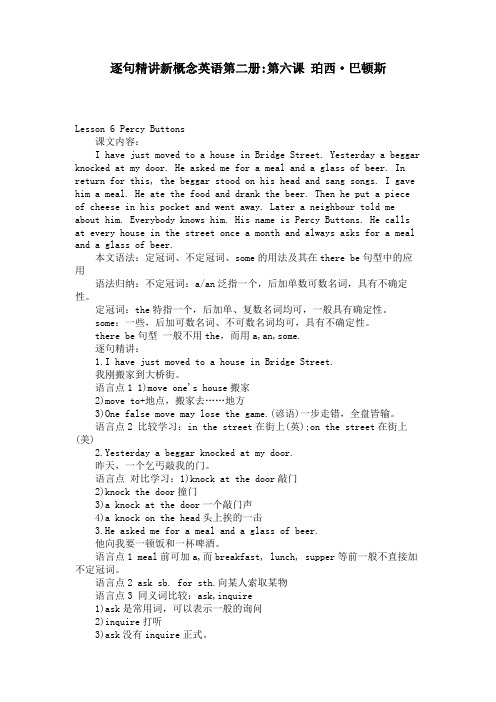
逐句精讲新概念英语第二册:第六课珀西·巴顿斯Lesson 6 Percy Buttons课文内容:I have just moved to a house in Bridge Street. Yesterday a beggar knocked at my door. He asked me for a meal and a glass of beer. In return for this, the beggar stood on his head and sang songs. I gave him a meal. He ate the food and drank the beer. Then he put a piece of cheese in his pocket and went away. Later a neighbour told me about him. Everybody knows him. His name is Percy Buttons. He calls at every house in the street once a month and always asks for a meal and a glass of beer.本文语法:定冠词、不定冠词、some的用法及其在there be句型中的应用语法归纳:不定冠词:a/an泛指一个,后加单数可数名词,具有不确定性。
定冠词:the特指一个,后加单、复数名词均可,一般具有确定性。
some:一些,后加可数名词、不可数名词均可,具有不确定性。
there be句型一般不用the,而用a,an,some.逐句精讲:1.I have just moved to a house in Bridge Street.我刚搬家到大桥街。
语言点1 1)move one's house搬家2)move to+地点,搬家去……地方3)One false move may lose the game.(谚语)一步走错,全盘皆输。
新概念英语第二册第六课精品课件演示文稿

第31页,共43页。
8. 在逢十的复数数词前表示 某个年代 请看以下两个例子:
第32页,共43页。
1. When he went to America in the seventies, he was already in
新概念英语第二册第六课精品 课件演示文稿
第1页,共43页。
优选新概念英语第二册第六课 精品课件
第2页,共43页。
Do you give money to the beggars(乞丐) in the street?
第3页,共43页。
NEW Words
tell return
beggar food
pocket money 零用钱
pocket dictionary/ knife
pocket pick:车上的小偷
第5页,共43页。
call v.打电话,取名
eg. Call me this evening, if it’s convenient for you.
They call the baby Helen. call on 拜访
: • Jack has moved out. John will move in the day after
tomorrow. • 杰克已经搬走了。约翰后天搬进来。
8
第8页,共43页。
Further notes on the text
Yesterday a beggar knocked at
my door. He asked me for a
• Please guess(猜想) what is happening. • Listen to the tape and answer this question:
新概念第二册第六课讲解.doc

Lesson 6 Percy Buttons【New words and expressions】★beggar n. 乞丐beg v.乞求I beg your pardon?beg for 乞求得到ask for 请求得到(ask sb. for sth. 向某人索要某物)★food n. 食物(不可数)a lot of food★pocket n. 衣服口袋inner pocket 内口袋;jacket pocket 夹克的口袋;coat pocket 大衣口袋pocket book 袖珍书;pocket dictionary 袖珍词典pocket pick 车上的小偷pocket money (小孩的)零花钱change 零钱get exact change 准备好正确的零花钱beer money (男人的)零花钱★call v. 拜访, 光顾① vt.&vi. 叫,喊I heard someone calling.call out =shout 大声喊② vt. 呼唤,召唤Lucy is sick. Please call a doctor.③ vi. 访问,拜访;(车、船等)停靠Amy called (at our house) yesterday.The train calls at large stations only. 这列火车只停大站。
call on sb. 拜访某人I will call on you. 我要去你家。
call at+地点=visit someplace 拜访某地I will call at your home. 我要去你家。
④ vt.&vi. 打电话call sb =call up sb. 给某人打电话call back 回某人电话Can you take a message for me? =Can you tell him to call back?call in sb. 招集和邀请某人For the project, the government called in a lot of experts.【课文讲解】1、Yesterday a beggar knocked at my door.★knock v. 敲门① vi. 敲门I knocked, but no one answered.knock at 敲(门、窗等)knock at the door;knock at the window② vt.&vi. 碰撞You always knock things off the table. 你总是碰掉桌上的东西。
新概念第二册第六课讲解(1)
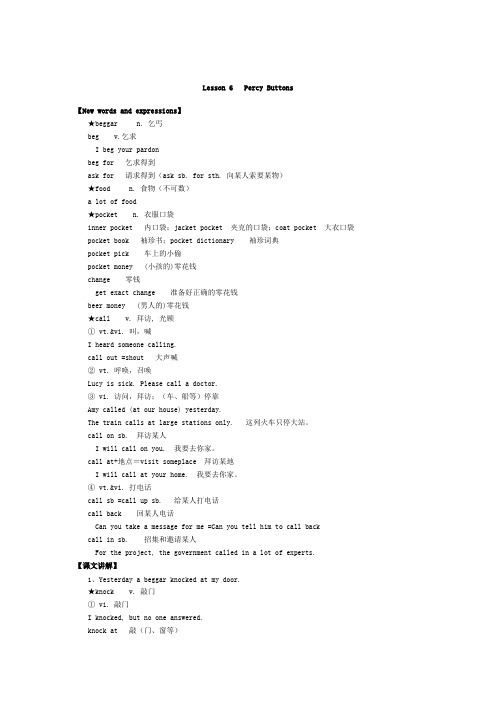
Lesson 6 Percy Buttons【New words and expressions】★beggar n. 乞丐beg v.乞求I beg your pardonbeg for 乞求得到ask for 请求得到(ask sb. for sth. 向某人索要某物)★food n. 食物(不可数)a lot of food★pocket n. 衣服口袋inner pocket 内口袋;jacket pocket 夹克的口袋;coat pocket 大衣口袋pocket book 袖珍书;pocket dictionary 袖珍词典pocket pick 车上的小偷pocket money (小孩的)零花钱change 零钱get exact change 准备好正确的零花钱beer money (男人的)零花钱★call v. 拜访, 光顾① vt.&vi. 叫,喊I heard someone calling.call out =shout 大声喊② vt. 呼唤,召唤Lucy is sick. Please call a doctor.③ vi. 访问,拜访;(车、船等)停靠Amy called (at our house) yesterday.The train calls at large stations only. 这列火车只停大站。
call on sb. 拜访某人I will call on you. 我要去你家。
call at+地点=visit someplace 拜访某地I will call at your home. 我要去你家。
④ vt.&vi. 打电话call sb =call up sb. 给某人打电话call back 回某人电话Can you take a message for me =Can you tell him to call back call in sb. 招集和邀请某人For the project, the government called in a lot of experts.【课文讲解】1、Yesterday a beggar knocked at my door.★knock v. 敲门① vi. 敲门I knocked, but no one answered.knock at 敲(门、窗等)knock at the door;knock at the window② vt.&vi. 碰撞You always knock things off the table. 你总是碰掉桌上的东西。
新概念英语第二册-第六课-Lesson6-L6-Percy-Buttons讲课教案

• I gave him a meal. He ate the food and drank the beer. Then he put a piece of cheese in his pocket and went away. Later a neighbour told me about him.
11
Key structures
冠词(article)是一种虚词,用在名词或名词词组的前 面。冠词可分为不定冠词和定冠词两种形式: 不定 冠词有 a, an(泛指), 定冠词有 the(特指) 。
无忧PPT整理发布
Words and expressions
call v.打电话,取名 eg. Call me this evening, if it’s convenient for yelen. call on 拜访
(宾语常为表示人的名词或代词) eg. I called on him yesterday. call at 拜访
I have just moved to a house in Bridge Street.
move vt.移动,感动 vi.移动,迁移,
eg. I have just moved in. 我刚刚搬进来。
• 在表达“搬家”这个意思时move可以单独使用, 也可以组成短语move to, move into, move in, move out等:
无忧PPT整理发布
9
Further notes on the text
Everyone knows him. His name is Percy Buttons. He calls at every house in the street once a month and always asks for a meal and a glass of beer.
新概念英语第二册第六课课文详解
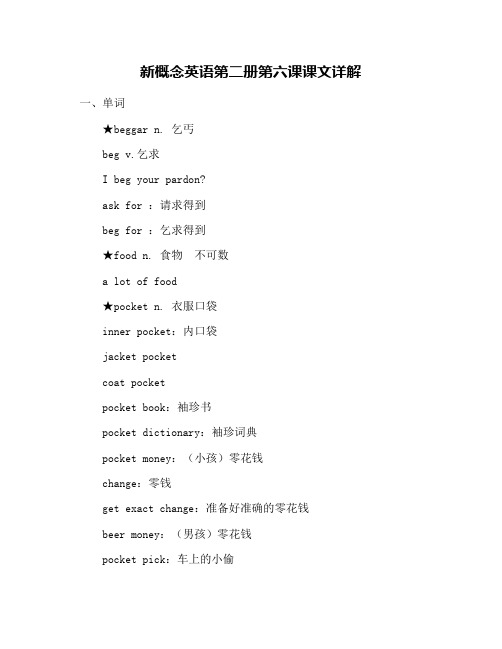
新概念英语第二册第六课课文详解一、单词★beggar n. 乞丐beg v.乞求I beg your pardon?ask for :请求得到beg for :乞求得到★food n. 食物不可数a lot of food★pocket n. 衣服口袋inner pocket:内口袋jacket pocketcoat pocketpocket book:袖珍书pocket dictionary:袖珍词典pocket money:(小孩)零花钱change:零钱get exact change:准备好准确的零花钱beer money:(男孩)零花钱pocket pick:车上的小偷★call v. 拜访,光顾visitcall sb:给某人打电话call up sb:给某人打电话call back:回某人电话Can you take a message for me?Can you tell him to call back?call on sb 拜访某人call at,at一般和地点相连call at+地点=visit someplace 拜访某地I will call on you.I will call at your home.call out =shout,大声喊call in sb:招集和邀请某人For the project,the government called in a lot of experts.二、词组讲解1、knock [动词] ①敲,打(某物)例句:He knocked several times on the window.他敲了几下窗。
②批评,数落例句:This magazine seems to be fond of knocking Lindsay Lohan's private life.这家杂志似乎很热衷挖苦林赛o罗韩的私生活。
短语扩展:knock it off (俚语,尤用于祈使句)别吵了、别争了knock off (sth.) 停止做某事(尤指工作)knock sb. out 击倒对手knock sb. /sth. over 撞倒某人knock sb. up (敲门、窗等)叫醒某人knock也可作名词,表示短促的敲或打,也可指爆炸震动声例句:I will give you a knock if you don't get up at 8 o'clock.如果你八点钟还没起床我就来敲门。
新概念英语第二册:第6课课文详解及语法解析

新概念英语第二册:第6课课文详解及语法解析课文详注 Further notes on the text1.I have just moved to a house in Bridge Street. 我刚刚搬进了大桥街的一所房子。
move常用的意义是“动”、“移动”。
在这句话里它的意思是“搬家”、“迁移”,为不及物动词。
在表达“搬家”这个意思时move可以单独使用,也可以组成短语move to, move into, move in, move out等:Jack has moved out. John will move in the day after tomorrow.杰克已经搬走了。
约翰后天搬进来。
2.He asked me for a meal and a glass of beer. (他问)我要一顿饭和一杯啤酒。
在表示请求时,可以用ask+sb.+for+sth.,也可以直接用ask for:Don't always ask others for help.别总向他人求助。
He never asks his parents for money.他从来不向父母要钱。
3.in return for this 作为报答,作为交换in return可以单独使用,也可以加介词for说明原因:You lent me this interesting book last month. In return (for it), I'll show you some picture books.你上个月把这本有趣的书借给了我。
作为报答,我将给你看一些画册。
In return for your help, I invite you to spend the weekend with my family.你帮了我的忙。
作为回报,我邀请你与我的家人一起过这个周末。
ter a neighbour told me about him. 后来,一位邻居告诉了我他的情况。
新概念第二册第6课课件

• Later a neighbour told me about him.
• Tell v. 告诉
• tell sb. about sth. 告诉某人某事
• 让我告诉你他的事吧。
• Let me tell you about him
• tell sb sth
告诉某人某事
• 告诉你一个秘密
• Tell you a secret
• 他告诉我他喜欢棒球
• He told me that he liked baseball.
• Tell the truth 老实讲
• I told you so!.
• 你看,我早就说 过的(你就是不听我的话)!
• Everybody knows him.
• everybody作为主语一定作单数看待
• I'll ~ on you on Sunday. • call at sp 拜访某地 • 昨天我去布朗先生家拜访
• I ~ed at Mr. Brown's yesterday. • (2)v.打电话 • Call sb up=ring sb up 给某人打电话 • 今天晚上,我会给你打电话。
• I’ll call you up this evening.
• my toothache returned in a few hours.
• Stand on one’s head 头顶地倒立 • stand on one's hands 用手着地 • Stand (stood, stood) • 1)v. 站立, 直立 • 当我给你拍照时,站着别动。
• Stand still while I take your photograph. • 2)v. 起立 • stand up! 起立! • 3)v. 容忍 • 尤其用于否定句和疑问句中,与can/ could 连用 • 他受不了炎热的天气
6.肖新概念英语第二册Lesson6课件

[比较] stand on one‘s feet站着; stand on one foot 单足站立 Can you stand on one foot for an hour? 你能单脚站立一个小时吗? Having stood on his feet for a long time, he felt very tired. 站了很长时间了,他感到累了。
I gave him a meal. He ate the food and drank the beer. • food n. 食物(不可数) • a lot of food (a lot of 可用于可数/不可数名词
)
• mental food 精神食粮
• 注意 food 本身是不可数名词 但是当时其表 示一种特定的食物的时候 是可数的 • 如 baby foods 婴儿食品
(2)向某人要,要求某物 我的弟弟每年都向我要押岁钱。 My little brother begs me for lucky money every year. 那个小女孩向妈妈要了一条漂亮的裙子 The girl begged her mother for that beautiful skirt. beg sb to do sth 乞求某人做某事 beg sb not to do sth 乞求某人不做某事 他知道他伤害了她,现在乞求她原谅他 He knew that he had hurt her and begged her to forgive him 他们乞求我们不要惩罚他们 They begged us not to punish them I beg your pardon!
(3) vt.&vi. 叫,喊 我听到有人在喊。 I heard someone calling. call out =shout 大声喊 简隔街看见男朋友时,就大声喊他 Jane called out her boyfriend's name when she saw him across the street. (4) vt. 呼唤,召唤 露西病了,叫医生来。 Lucy is sick. Please call a doctor.
- 1、下载文档前请自行甄别文档内容的完整性,平台不提供额外的编辑、内容补充、找答案等附加服务。
- 2、"仅部分预览"的文档,不可在线预览部分如存在完整性等问题,可反馈申请退款(可完整预览的文档不适用该条件!)。
- 3、如文档侵犯您的权益,请联系客服反馈,我们会尽快为您处理(人工客服工作时间:9:00-18:30)。
lesson 6 Percy Buttons一、生词和短语(词汇学习)词汇学习★knockknock at 敲(门窗等) ;knock at the door敲门knock off:下班,He knocked off earlier.knock sth off+地点:把某物从某处碰翻;knock the vase off the tableknock off:打折,knock 10% off the price. 把价格降低10%。
knock over:打翻,碰翻A car knocked the boy over. He knocked a glass over. 他把玻璃杯打翻了。
如果有地点,off; 无地点,over,I knocked the boy off the bicycle.knock out:淘汰;击败;出局;使不省人事;The thief stuned the police in the fight. 在搏斗中,小偷把警察打昏了。
★beggar n. 乞丐beg v.乞求;I beg your pardon?ask for :请求得到;beg for :乞求得到★food n. 食物不可数;a lot of food★pocket n. 衣服口袋★call v. 拜访,光顾call sb:给某人打电话;call up sb:给某人打电话call back:回某人电话;Can you tell him to call back?call on sb拜访某人;I will call on you.call at+地点=visit someplace拜访某地;I will call at your Home.call out =shout,大声喊call in sb:招集和邀请某人;For the project,the government called in a lot of experts.二、听力(回答问题)三、课文讲解(语法)四、课后习题【课文讲解】1、I have just moved to a house in Bridge Street. 我刚刚搬进了大桥街的一所房子。
move常用的意义是“动”、“移动”。
在这句话里它的意思是“搬家”、“迁移”,为不及物动词。
在表达“搬家”这个意思时move可以单独使用,也可以组成短语:move to 指从一地移动到另一个地方。
例如:I moved from Changsha to Guangzhou ,我从长沙搬到广州。
move in 是指从搬进某个地方。
例如:I moved in my new room.我搬进饿了新房间。
move into 强调动作性,例如:I moved into the new room quickly,.我很快搬进了新房。
意思差别并不大的。
move out:搬出;例如:Jack has moved out. John will move in the day after tomorrow.杰克已经搬走了。
约翰后天搬进来。
2、He asked me for a meal and a glass of beer. (他问)我要一顿饭和一杯啤酒。
Ask sb for sth.问某人要什么东西;ask for:请求,要求;He never asks his parents for money.他从来不向父母要钱。
The guest asked for the manager.客人要见经理.ask sb to do sth :要求某人做某事3、in return for this 作为报答,作为交换;in return可以单独使用,也可以加介词for说明原因:in return作为回报;He doesn't want anything in return.in return for作为....的回报;I'll do something for you in return for you help4、the beggarstood on his head and sang songs.stand on one's hands:用手着地;stand on one's knees:跪着;knees:膝盖5、Then he put a piece of cheese in his pocket and went away.cheese n. 乳酪,干酪(不可数名词) a piece of cheese 一块乳酪; two pieces of cheese a piece of:一块; 一片; 一张; 一件;一般说来,不可数名词不可以用数目来计数,若要计数,则要借助单位词,其中用于对不可数名词计数的最常用的单位词就是piece,其意为“张”、“块”、“条”等:a piece of paper 一张纸 a piece of advice一条建议a piece of news一条消息6、Later a neighbour told me about him. 后来,一位邻居告诉了我他的情况。
介词about可以和一些动词连用,以表示“关于……(的)”、“涉及……(的)”:Please tell me about the accident.请告诉我这次事故的一些情况。
He spoke to me about his dog.他和我讲了讲他的狗。
I have read about him.关于他的情况我曾经读到过。
7、once a month 每月一次once表示频率时后面直接加表示时间的名词:Jane wrote to her parents once a week.简每星期给父母写封信。
He goes back to the South once a year.他每年回一次南方。
The postman calls once a day.邮递员每天来一次Key structures】关键句型a,the和somea:单数,可数名词the:可加单数/复数,还可加不可数名词,加在什么名词前面都对some:只能加在不可数名词的前面或可数名词复数的前面a和the的区别a是泛指,a man;特指,the man在文章当中第一次出现名词的时候往往用a和an修饰,第二次出现的时候用the在表示一种笼统感念的陈述句中可以省略a和someYesterday I bought a book,Books are not very expensive.笼统感念:某某一类/一种东西a和theA man is walking towards me.The man is carrying ameat.We cannot put a or the in front of names表示某某一类人当中,具有这种特征当中的一个,a Mr.zhang【Special Difficulties】难点某些动词的后面加上介词或副词以后就会改变词义,这种新的组合称作短语动词put:放,put on穿上;戴上;把…放上去Don't put the cup on the table!别把杯子放在桌上!It is cold outside. Put on your coat. 今天外面冷。
穿上外衣。
take:拿走,take off:拿走;脱下(衣帽等);Someone has taken my pen.有人把我的钢笔拿走了。
Take off your wet shoes, please.请把你的湿鞋子脱掉。
look:看,look at:看,look for:寻找,look afrer:照顾,look out:当心语法Grammar in use1.a, the与some的用法a:单数,可数名词;the:可加单数/复数,还可加不可数名词;some:只能加在不可数名词的前面或可数名词复数的前面(1)a和the的区别a是泛指,a man;特指,the man在文章当中第一次出现名词的时候往往用a和an修饰,第二次出现的时候用theA man is walking towards me.The man is carrying a parcel.The parcelis full of meat.(2)当表示不确定的某个人或东西时,用不定冠词a/an:He bought a book this afternoon.今天下午他买了本书。
There is a man in front of your car.你的汽车前面有一个男人。
(3)当表示不可数的名词时,则需要由不定冠词加量词组成词组:A cup of coffee, please.请给我来一杯咖啡。
(4)some用于表示不确定的某些人或东西,可数和不可数都可以:He put some books on the desk.他把一些书放在了桌上。
(5)如果指某个确定的人或事物或者上文已提到过的人或事物,则要用定冠词the(有时相当于this/ that):The man has just left.那人刚走。
Do you still want the ticket?你还想要这张票吗?(6)在姓名、地名、国名(非复合词)以及月份、星期等前面不加任何冠词:Tom is in Germany now. He studies physics in Berlin. He has a house in Bridge Street.汤姆现在在德国。
他在柏林学习物理学。
在大桥街他有一所房子。
April is a pleasant month.4月气候宜人。
He has classes on Monday.他星期一有课。
冠词的用法比较复杂,需慢慢积累。
